As a parent, you want your child to have a well-rounded education. After-school activities, child activities, and extracurricular programs are key. They help with social skills, academic performance, and health. But, what makes an activity truly good for your child?
After-school activities can help your child learn new skills, feel confident, and make friends. With many options, from sports to music, it’s hard to choose. It’s important to pick activities that offer the most value for your child.
Key Takeaways
- After-school activities can enhance your child’s social skills and academic performance
- Child activities and extracurricular programs can improve physical and mental health
- Considering your child’s interests and needs is key when choosing an after-school program
- After-school activities can provide opportunities for your child to develop new skills and build confidence
- Engaging your child in extracurricular programs can help them make lasting friendships
- Researching and evaluating different after-school activities is essential to finding the right fit for your child
Understanding the Importance of After-School Activities
As a parent, you want your child to have a well-rounded education. After-school activities are a great way to give them enriching activities. They help your child develop new skills, make friends, and feel more confident. These activities are available in many youth programs for different interests and ages.
Being part of after-school activities can greatly help your child socially. They learn important skills like teamwork, communication, and problem-solving. These skills are key for success in life. Educational programs also give your child a chance to excel in school and prepare for their future careers.
Benefits for Social Development
- Teamwork and collaboration
- Improved communication skills
- Development of empathy and understanding
Academic Enhancement Opportunities
After-school activities also offer chances to improve academically. Your child can get tutoring, mentoring, and join special programs. These can help them do better in school, love learning, and discover new interests.
Physical and Mental Health Benefits
Joining after-school activities can also boost your child’s health. Sports and creative activities can lower stress, improve mood, and increase energy. They also help keep your child physically fit and healthy.
Types of Popular After-School Programs
When looking for after-school programs for your child, you’ll find many options. These programs include sports and arts for kids who love to be creative or stay active. They help kids learn teamwork and communication while keeping them physically and mentally healthy.
Skill-building classes are perfect for kids who want to learn new things. Classes can teach coding, programming, languages, or music. This helps kids get ready for school and future careers.
- Sports teams, such as soccer, basketball, or tennis
- Art classes, including painting, drawing, or sculpture
- Music lessons, such as piano, guitar, or violin
- Coding and programming classes, like Python or Java
- Language classes, such as Spanish, French, or Mandarin
These programs help kids balance school with fun activities. This keeps them engaged, motivated, and happy.
Think about what your child enjoys and is good at. This will help you pick the best after-school program. Whether it’s for fun or learning, the right program can really help your child grow and succeed.
Assessing Your Child’s Interests and Abilities
Choosing after-school activities for your child is important. It’s key to think about their interests and skills. This way, they can enjoy the activity and learn a lot.
Start by watching how your child acts and what they talk about. This can help you see what they like to do. Some kids might have talents in music, art, or sports. It’s also important to pick activities that fit their age.
Recognizing Natural Talents
- Pay attention to your child’s strengths and weaknesses
- Encourage them to explore different activities to find what they enjoy
- Provide opportunities for them to develop their talents
Understanding Age-Appropriate Activities
It’s important to know what activities are right for your child’s age. Look into safety, skill level, and how they interact with others. This helps you make good choices.
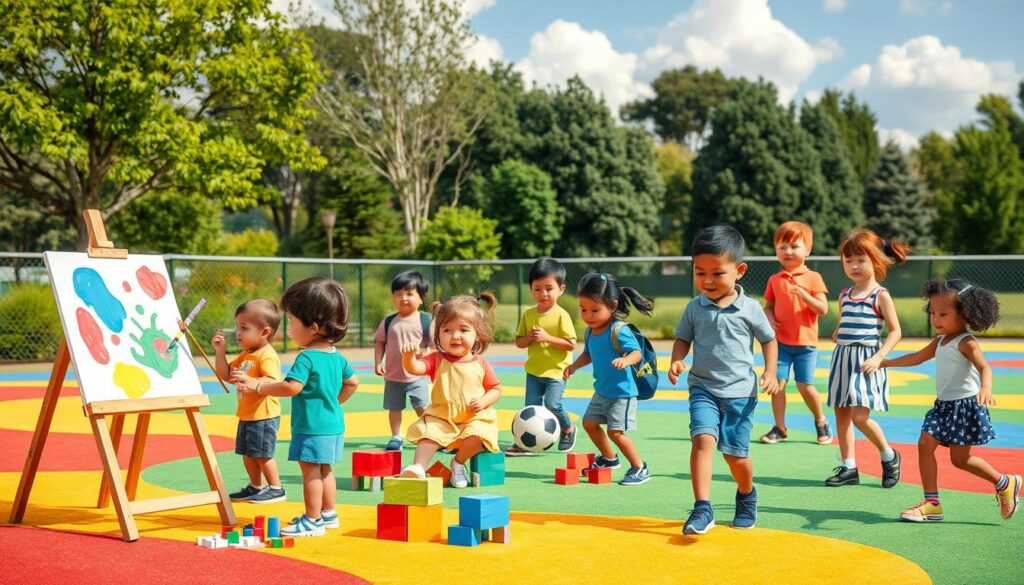
Considering Your Child’s Personality Type
Your child’s personality matters too. A shy child might like smaller groups, while an outgoing child might enjoy bigger teams. Think about what they need to be happy and successful.
Finding the Right Balance Between Academic and Recreational Activities
As a parent, you want your child to have a balanced life. This includes both schoolwork and fun activities. After-school activities and extracurricular programs are key, but don’t overdo it.
Having a balance is good for many reasons. It helps with time management, boosts productivity, and improves well-being. Here’s how to get it right:
- Set clear priorities and goals for your child’s academic and recreational activities
- Encourage your child to try different after-school activities and extracurricular programs to find what they enjoy
- Keep an eye on your child’s schedule and make changes if needed to make sure they have time for homework, rest, and family

By balancing school and fun, you help your child grow into a happy, healthy, and well-rounded person.
After-School Activities: Finding the Right Fit for Your Child
Looking for the right after-school program means finding a safe and caring place for your child to grow. Youth programs and educational programs offer many activities for different interests and needs.
When evaluating these programs, consider a few key things:
- Qualifications and experience of instructors
- Safety and condition of facilities
- Reputation and reviews from other parents
These factors help you choose the best program for your child. Look for programs that match your child’s interests and abilities. They should also offer a mix of fun and learning. 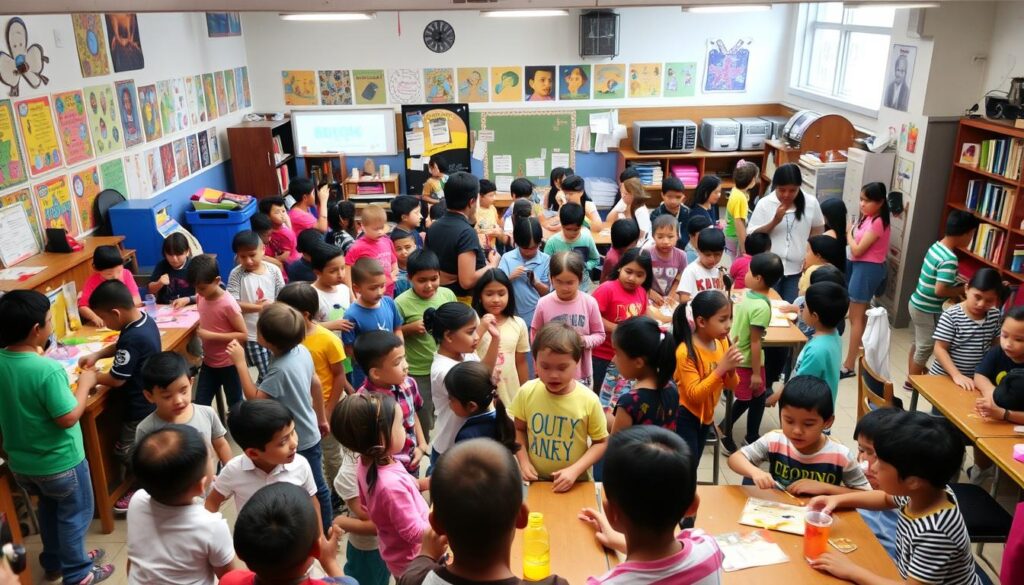
Popular youth programs and educational programs include sports teams, art classes, and science clubs. These activities teach new skills and help children develop important life skills like teamwork and problem-solving.
| Program Type | Benefits |
|---|---|
| Sports Teams | Develops teamwork and communication skills |
| Art Classes | Encourages creativity and self-expression |
| Science Clubs | Fosters curiosity and critical thinking |
By considering these factors and options, you can find the perfect after-school program for your child. It should be both fun and educational, matching their interests and needs.
Managing Time and Schedule Commitments
Managing your child’s schedule can be tough, balancing fun activities and classes. It’s key to make a weekly schedule that’s balanced and healthy.
A good schedule lets your child do sports, music, or art. It also makes time for school and family. Think about your child’s age, interests, and energy to ensure they rest enough.
Creating a Balanced Weekly Schedule
Begin by listing your child’s activities, like school, homework, and clubs. Then, sort these by importance and time needed. Always add some extra time for surprises or schedule changes.
Transportation Considerations
Transportation is important when planning your child’s schedule. For activities that need a ride, like sports or music, think about carpooling or public transport. This makes things easier for you and your child.
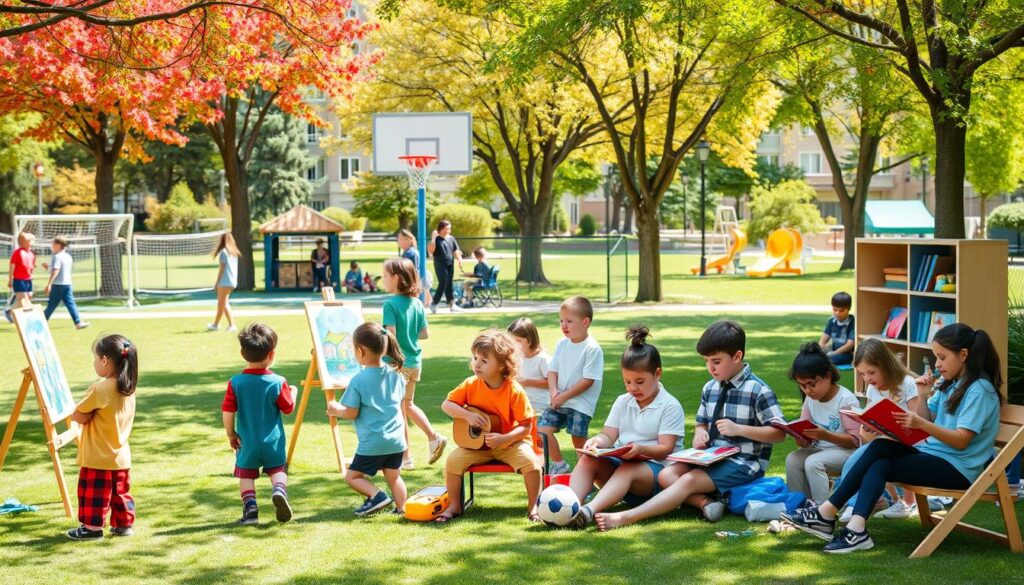
By using these tips, you can make a schedule that works for your child. This lets them enjoy their activities and classes.
| Activity | Time Commitment | Priority |
|---|---|---|
| School hours | 8 hours | High |
| Homework time | 2 hours | Medium |
| Sports practice | 3 hours | High |
Budgeting for After-School Programs
When thinking about after-school activities for your child, remember the cost. Finding affordable options can be tough, but it’s doable. Look for local groups that offer after-school activities at a lower price. Many places like community centers, schools, and non-profits have budget-friendly programs for child activities.
Some programs might offer scholarships or financial help. You can also check out government programs that support after-school activities for kids from low-income families. Don’t forget to ask local businesses or organizations if they have sponsorships or grants for child activities.
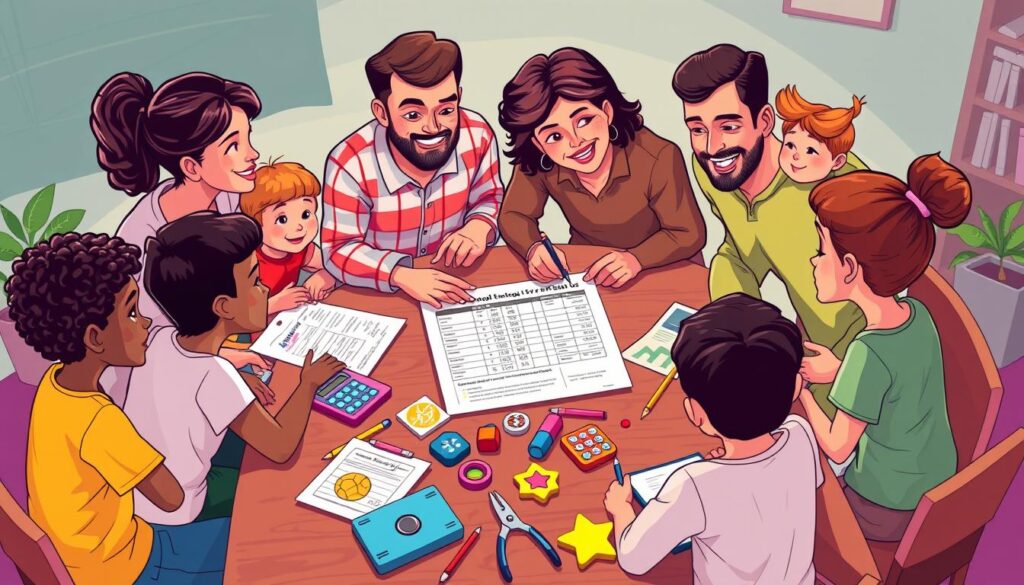
When planning your budget for after-school activities, focus on what’s most important. Make a list of your child’s favorite programs and rank them. Think about cheaper alternatives like online classes or volunteer work. By being smart with your budget and looking for deals, you can give your child a variety of child activities that help them grow and stay happy.
- Research local organizations that offer affordable after-school activities
- Look into scholarships or financial aid programs
- Consider government-funded programs or sponsorships
- Prioritize your spending and rank programs based on importance
By carefully planning your budget for after-school activities, you can help your child succeed in their chosen activities. Plus, you’ll keep your family’s finances in check.
Signs Your Child is Thriving in Their Activities
As a parent, it’s key to know if your child is doing well in their activities. One big sign is when they feel more confident. This happens when they’re in programs that match their interests.
Another sign is when they get better at something. This could be a sport, music, or art. Encouraging your child to try different things helps them find what they love and feel a sense of purpose.
Here are some key signs to look out for:
- Increased enthusiasm for the activity
- Improved social skills and friendships
- Enhanced physical or mental well-being
- A sense of accomplishment and pride in their work
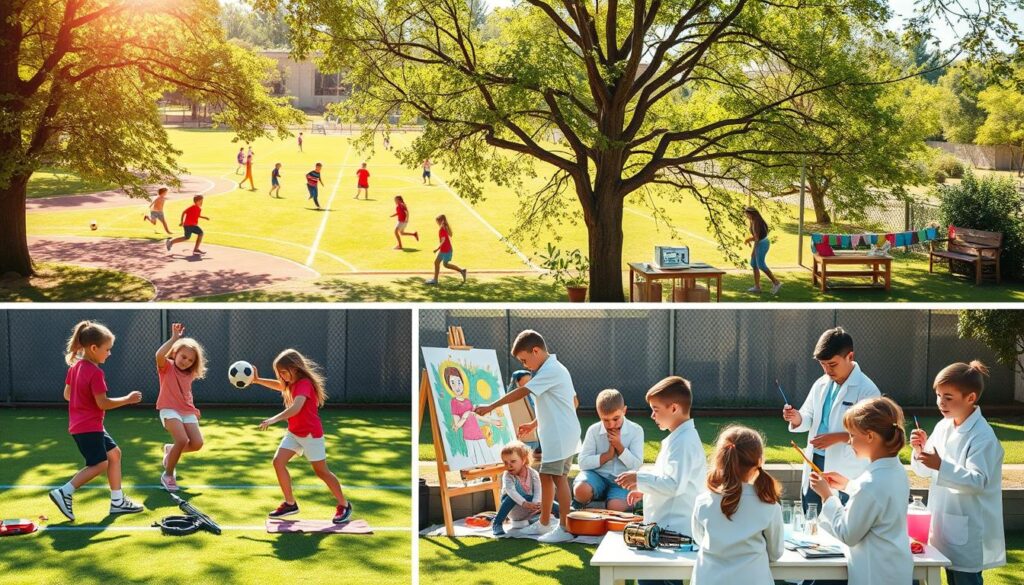
But, it’s also important to watch for signs of burnout. This includes feeling tired, unmotivated, or not enjoying activities anymore. By keeping a balanced schedule and talking openly with your child, you can help them avoid burnout.
| Signs of Thriving | Warning Signs of Burnout |
|---|---|
| Increased confidence | Decreased motivation |
| Improved skills | Fatigue |
| Enhanced physical or mental well-being | Lack of interest in activities |
Supporting Your Child’s Activity Journey
As a parent, you are key in supporting your child’s after-school activities. Picking activities that match their interests can really help them grow. Look for programs that make learning fun and engaging for your child.
Being supportive is essential for your child’s journey. You can do this by going to events, asking questions, and listening to their stories. This helps them feel confident and find their purpose. Positive communication is vital to understand their feelings and concerns.
Building a Strong Support System
To create a supportive space, consider these steps:
- Set clear expectations and goals with your child
- Encourage open communication and feedback
- Attend events and show interest in your child’s activities
By following these steps, your child can excel in their activities and educational programs. Remember, finding the right activities is a journey that needs patience, understanding, and support.
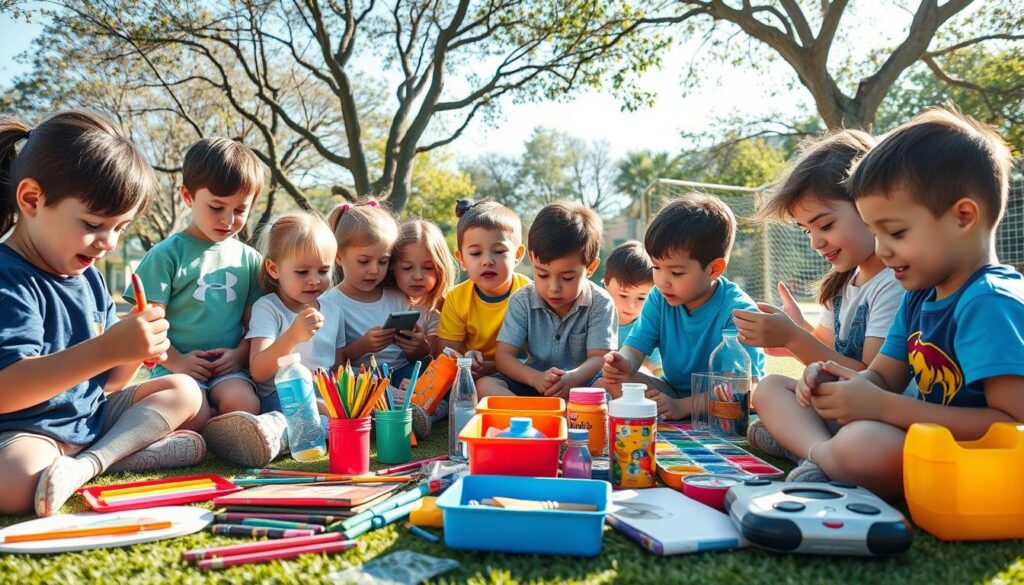
Handling Activity Changes and Transitions
As your child grows, their interests in recreational activities might change. It’s important to be ready for these shifts. This ensures your child has a smooth experience.
Whether they want to switch skill-building classes or try something new, support their choices. But also think about their overall growth.
Some important things to consider when dealing with changes include:
- Evaluating the reasons behind the desired change
- Assessing the impact on their schedule and other activities
- Researching new options and their benefits
Being open to change and supporting your child’s interests helps them feel confident. Make sure their development and happiness are your main focus.
Handling changes and transitions means being flexible and supportive. Work with your child and think about their unique needs. This way, they can excel in their activities and enjoy their experiences.
Making Seasonal Activity Adjustments
As a parent, you want your child to stay active and engaged all year. After-school activities change with the seasons. In summer, look into summer programs that match your child’s interests.
Summer activities include sports camps, art programs, and outdoor adventures. These help your child learn new skills, make friends, and create memories. Choose a program that’s safe, has good instructors, and has a clear schedule.
When school starts, find after-school activities that fit your child’s schedule. This could be sports, music lessons, or clubs. Seasonal changes help your child stay active and motivated all year.
- Summer program options: sports camps, art programs, outdoor adventures
- School year activities: sports teams, music lessons, clubs
Think about your child’s interests, skills, and schedule when choosing activities. This way, they’ll have a positive and enriching experience.
| Season | Activity Options |
|---|---|
| Summer | Sports camps, art programs, outdoor adventures |
| School Year | Sports teams, music lessons, clubs |
Conclusion
Finding the right after-school activities for your child is a rewarding journey. It’s filled with opportunities for growth, learning, and fun. These programs can help your child develop social skills, improve their academic performance, and stay healthy.
Stay involved in your child’s after-school activities. Provide encouragement and keep the lines of communication open. This way, you can help them find activities that match their interests and needs.
Be ready for changes as your child grows and discovers new things. With your support, they’ll be confident in exploring new passions and reaching their full abilities.
We wish you and your child a fulfilling experience in after-school activities. May the memories and lessons they gain inspire them to live a life full of curiosity, growth, and a love for learning.
